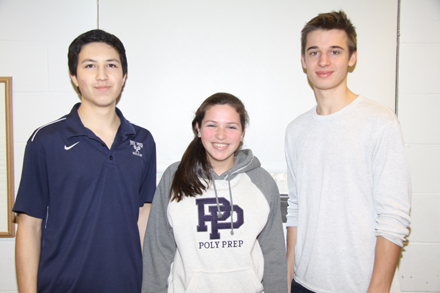Brooklyn science: Remarkable student research at Poly Prep

Three Poly Prep Country Day School seniors — Alexandra Capellini, Zachary Kaletsch, and Sam Nakagawa — have carried out remarkably sophisticated research projects over the course of the past three years as part of a special Science/Engineering research class at the Dyker Heights school.
Capellini disproved a theory that coleus plants have a “drought memory” that enables them to recover at a stronger rate from a second drought than a first. Kaletsch ran DNA tests on tomato plants to see if he could detect if they had been genetically modified. And Nakagawa tested whether the blade angle on a wind turbine could affect the power output of the turbine.
The students began their research as sophomores. Over the years they designed and developed their projects, wrote formal research papers and submitted them to the Intel Talent Search competition and New York City Science and Engineering Fair (NYCSEF). Now they are awaiting results as they finish up their college application process.